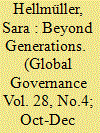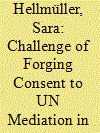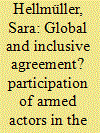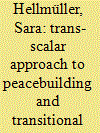|
|
|
Sort Order |
|
|
|
Items / Page
|
|
|
|
|
|
|
| Srl | Item |
| 1 |
ID:
190214


|
|
|
|
|
| Summary/Abstract |
Authors commonly categorize peace missions according to different generations: first-generation missions serving as interposition forces to monitor a cease-fire, second-generation missions with multidimensional mandates, and third-generation missions with enforcement mandates. While the generation typology is useful to show the development of peace missions over time, this article points to four main limitations: ambiguity, reductionism, linear connotations, and restricted applicability. It proposes an alternative categorization distinguishing between a minimalist approach aiming at ending violence, a moderate approach aiming at ending violence and installing some form of good governance, and a maximalist approach aiming at addressing the root causes of conflict. Based on an analysis of all UN peace missions between 1991 and 2020, the article demonstrates how this new classification overcomes the flaws of the generation typology and presents further advantages related to its focus on objectives, its versatility, and its potential for statistical analysis. It thereby allows for a more accurate analysis of UN peace missions and their effectiveness.
|
|
|
|
|
|
|
|
|
|
|
|
|
|
|
|
| 2 |
ID:
183956


|
|
|
|
|
| Summary/Abstract |
This article analyzes how the internationalization of civil wars influences conflict parties’ consent to UN mediation processes. Illustrated by the UN mediation in Syria, I argue that internationalization influences consent directly by obstructing the advent of a costly stalemate and the parties’ perception of mediation as a ‘way out,’ and indirectly by reducing mediators’ leverage and perceived impartiality thereby limiting their tools to foster consent. The article makes three contributions. First, it presents a novel conceptual framework to understand the impact of internationalization on conflict parties’ consent. Second, it provides a long-term analysis of UN mediation in Syria from 2012–2020. Third, it contributes to a broader discussion about how civil wars end. This is of particular relevance as the prioritization of a political over a military end to civil wars, which was dominant in the early post-Cold War period, is no longer unquestioned.
|
|
|
|
|
|
|
|
|
|
|
|
|
|
|
|
| 3 |
ID:
188610


|
|
|
|
|
| Summary/Abstract |
This article examines how major powers conceive the role of the United Nations (UN) in peacebuilding. We conceptualize the UN’s role along the distinction between conflict management and conflict resolution and distinguish between the types of tasks and the approach the UN can adopt. We map states’ conceptions of the UN’s role in peacebuilding by coding peace-related speeches at the UN Security Council (1991–2020) delivered by China, France, Russia, the United Kingdom, the United States as well as Brazil, South Africa, and Turkey as rising regional powers. Our findings show that states’ conceptions differ regarding the type of tasks the UN should do. However, the main fault line between the countries lie in the approach the UN should adopt to conduct peacebuilding tasks. We conclude that major powers see a role for the UN beyond mere conflict management as long as it is done with respect for national sovereignty.
|
|
|
|
|
|
|
|
|
|
|
|
|
|
|
|
| 4 |
ID:
165663


|
|
|
|
|
| Summary/Abstract |
This article provides an analytical framework to understand how participation of armed actors in peace negotiations influences local violence. It argues that the link between violence and exclusion or inclusion of armed actors is often indirect and depends on armed actors’ underlying motivations to be included and their corresponding strategies. Based on an analysis of the Congolese peace process from 1999 to 2003, the article assesses how the mandate of the peace process influenced armed groups’ motivations to be included. It then analyzes the strategies that armed actors used to be included and examines their impact on local violence. Thereby, it allows for a more nuanced understanding of how participation of armed actors in a mediation process influences prospects for peace.
|
|
|
|
|
|
|
|
|
|
|
|
|
|
|
|
| 5 |
ID:
185793


|
|
|
|
|
| Summary/Abstract |
Failures to bring internationalised civil wars, such as in Syria, Libya, or Yemen, to a negotiated agreement have led to a questioning of the UN's role in peacemaking. The literature explains such mediation outcomes by examining micro-level aspects pertaining to either the mediation process or the conflict context. While both are important, they are influenced by macro-level dynamics related to world politics that have received less attention. Yet, such an awareness of the structural context in which mediation takes place is particularly relevant in times of tectonic shifts in world politics, such as the current change in world order from unipolarity to multipolarity. This article fills this gap by exploring the mechanisms through which macro- and micro-level factors interact in mediation, illustrated by the case of the UN mediation in Syria. The article thereby makes two contributions. First, it provides an analysis of the link between world politics and UN mediation by complementing micro-level explanations with a macro-level perspective. Second, it allows for a better understanding of UN mediation in internationalised civil wars, and particularly in Syria. Overall, the article contributes to reflections on how the UN can keep its relevance in peacemaking in a shifting world order.
|
|
|
|
|
|
|
|
|
|
|
|
|
|
|
|
| 6 |
ID:
183952


|
|
|
|
|
| Summary/Abstract |
This thematic issue explores the past, present, and future of UN mediation. Based on in-depth case studies of UN mediation in some of the most intractable contemporary armed conflicts, it shows the challenges related to lacking consensus amongst third parties, disunity in the UN Security Council, and the internationalization of conflicts. At the same time, it highlights the UN’s legitimacy, expertise, and convening power, and its importance in the context of broader international dispute management systems. It also underlines the need to rethink how we measure success of UN mediation efforts and to reflect on the consequences of increasing normative plurality in world politics. Finally, this issue points to some areas for future research, including more critical mediation theory, reflections about the worldviews underlying UN mediation, and innovative approaches related to the UN reform agenda.
|
|
|
|
|
|
|
|
|
|
|
|
|
|
|
|
| 7 |
ID:
188703


|
|
|
|
|
| Summary/Abstract |
Peace research has taken a local turn. Yet, conceptual ambiguities, risks of romanticization, and critiques of co-option of the “local” point to the need to look for novel ways to think about the interactions of actors ranging from the global to the local level. Gearoid Millar proposes a trans-scalar approach to peace based on a “consistency of purpose” and a “parity of esteem” for actors across scales. This article analyzes the concept of trans-scalarity in the peace process in Ituri, a province in the northeastern Democratic Republic of Congo (DRC). Drawing on qualitative data from more than a year of research in the DRC, I argue that while a trans-scalar approach was taken to end violence, it was not applied to transitional justice initiatives. The result was a negative, rather than a positive peace. By showing the high, but still untapped, potential of trans-scalarity, the article makes three contributions. First, it advances the debate on the local turn by adding empirical insights on trans-scalarity and further developing the concept’s theoretical foundations. Second, it provides novel empirical insights on the transitional justice process in the DRC. Third, it links scholarship on peacebuilding and transitional justice, which have often remained disconnected.
|
|
|
|
|
|
|
|
|
|
|
|
|
|
|
|
|
|
|
|
|